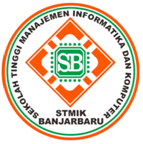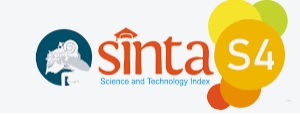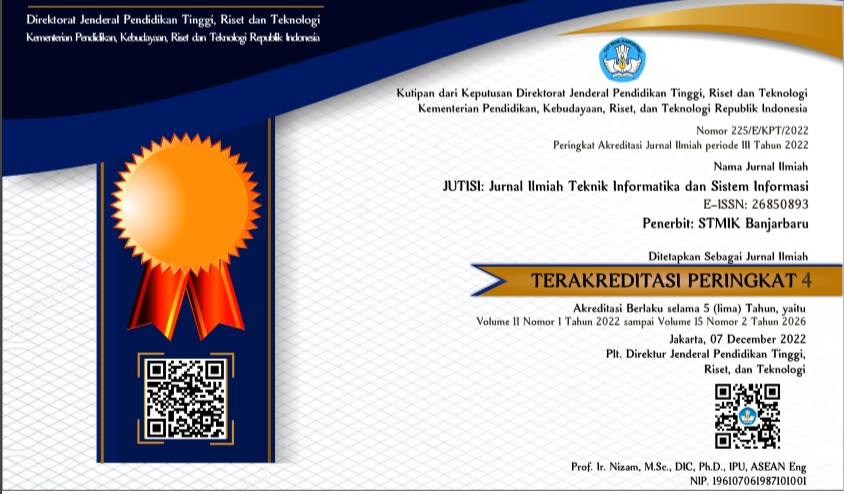Analisis Pengaruh Learning Management System terhadap Kepuasan dan Kinerja Pengguna dengan Pendekatan Delone and Mclane Model
Abstract
This research aims to analyze the use of the learning management system used at the Ministry of Finance by looking at the factors that influence user performance through user satisfaction which comes from system quality and information quality variables. The use of voluntary sampling (non-probability sampling) techniques in distributing the questionnaire obtained 183 respondents who came from LMS users. The results of data processing using the SMART PLS application state that the three hypotheses proposed were all accepted, namely system quality and information quality both significantly influence user satisfaction and user satisfaction significantly influences user performance, so it can be stated that the LMS used is good because it provides an influence in the form of satisfaction and performance to users.
Â
Abstrak
Penelitian ini bertujuan menganalisis penggunaan Learning Management System yang digunakan di Kementerian Keuangan dengan melihat faktor yang memengaruhi kinerja penggunanya melalui kepuasan pengguna yang berasal dari variabel kualitas sistem dan kualitas informasi. Penggunaan teknik Voluntary Sampling (non-probability sampling) dalam penyebaran kuesioner memperoleh responden sejumlah 183 yang berasal dari pengguna LMS. Hasil pengolahan data dengan menggunakan aplikasi SMART PLS menyatakan ketiga hipotesis yang diajukan semuanya diterima yaitu kualitas sistem dan kualitas informasi keduanya memengaruhi secara signifikan kepuasan pengguna dan kepuasan pengguna memengaruhi secara signifikan kinerja pengguna, sehingga dapat dinyatakan bahwa LMS yang digunakan sudah baik karena memberikan pengaruh berupa kepuasan dan kinerja kepada pengguna.
Â
Keywords
References
A. Y. Alqahtani and A. A. Rajkhan, “E-Learning Critical Success Factors During the Covid-19 Pandemic: A Comprehensive Analysis of E-Learning Managerial Perspectives,†Educ Sci (Basel), vol. 10, no. 9, p. 216,
A. Gegenfurtner and C. Ebner, “Webinars in Higher Education and Professional Training: A Meta-Analysis and Systematic Review of Randomized Controlled Trials,†Educ Res Rev, vol. 28, p. 100293, 2019, doi: https://doi.org/10.1016/j.edurev.2019.100293.
M. W. Rahman, R. Islam, A. Hasan, N. I. Bithi, M. M. Hasan, and M. M. Rahman, “Intelligent Waste Management System Using Deep Learning with IoT,†Journal of King Saud University-Computer and Information Sciences, vol. 34, no. 5, pp. 2072–2087, 2022, doi: https://doi.org/10.1016/j.jksuci.2020.08.016.
B. Bervell, I. N. Umar, and M. H. Kamilin, “Towards a Model for Online Learning Satisfaction (MOLS): Re-considering Non-linear Relationships Among Personal Innovativeness and Modes of Online Interaction,†Open Learning: The Journal of Open, Distance and e-Learning, vol. 35, no. 3, pp. 236–259, 2020, doi: https://doi.org/10.1080/02680513.2019.1662776.
S. A. Raza, W. Qazi, K. A. Khan, and J. Salam, “Social Isolation and Acceptance of the Learning Management System (LMS) in The Time of COVID-19 Pandemic: An Expansion of the UTAUT Model,†Journal of Educational Computing Research, vol. 59, no. 2, pp. 183–208, 2021, doi: https://doi.org/10.1177/0735633120960421.
Unicef Indonesia, “Dampak Pandemi COVID-19 Terhadap Proses Pembelajaran.â€
M. Durnali, “The Effect of Self-Directed Learning on the Relationship Between Self-Leadership and Online Learning Among University Students in Turkey,†Tuning Journal for Higher Education, vol. 8, no. 1, pp. 129–165, 2020, doi: https://doi.org/10.18543/tjhe-8(1)-2020pp129-165.
C. Lejeune, S. Beausaert, and I. Raemdonck, “The Impact on Employees’ Job Performance of Exercising Self-Directed Learning within Personal Development Plan Practice,†The international journal of human resource management, vol. 32, no. 5, pp. 1086–1112, 2021, doi: https://doi.org/10.1080/09585192.2018.1510848.
R. W. Zmud, “Individual differences and MIS success: A review of the empirical literature,†Manage Sci, vol. 25, no. 10, pp. 966–979, 1979.
N. Urbach and B. Müller, “The updated DeLone and McLean model of information systems success,†in Information systems theory, Springer, 2012, pp. 1–18.
E. Lwoga, “Critical Success Factors for Adoption of Web-Based Learning Management Systems in Tanzania,†International Journal of Education and Development using ICT, vol. 10, no. 1, pp. 213-222, 2014.
L. A. Hussein and M. F. Hilmi, “The Influence of Convenience on the Usage of Learning Management System,†Electronic Journal of e-Learning, vol. 19, no. 6, pp. pp504-515, 2021, Accessed: Aug. 09, 2023. [Online]. Available: https://doi.org/10.34190/ejel.19.6.2493
J. S. Mtebe and C. Raphael, “Key Factors in Learners’ Satisfaction with the E-Learning System at the University of Dar es Salaam, Tanzania,†Australasian Journal of Educational Technology, vol. 34, no. 4, pp. 128-137, 2018.
V. S. Sukandi and M. Ariyanti, “Analysis Acceptance and Use of CeLOE Learning Management System (LMS) Telkom University Using Unified Theory of Acceptance and Use of Technology (UTAUT) and Delone-McLean Model,†in Contemporary Research on Management and Business, CRC Press, 2022, pp. 252–255.
M. N. Yakubu and S. I. Dasuki, “Assessing eLearning Systems Success in Nigeria: An Application of the DeLone and McLean Information Systems Success Model,†Journal of Information Technology Education: Research, vol. 17, pp. 183–203, 2018, Accessed: Aug. 07, 2023. [Online]. Available: http://dx.doi.org/10.28945/4077
T. Widyaningrum, Q. Sholihah, and B. S. Haryono, “The Delone and McLean Information System Success Model: Investigating User Satisfaction in Learning Management System,†Journal of Education Technology, vol. 8, no. 1, pp. 47-56, 2024.
N. A. Larasati and S. Andayani, “Pengaruh Penggunaan Learning Management System (LMS) Terhadap Tingkat Kepuasan Mahasiswa Menggunakan Metode DeLone and McLean,†Jurnal Teknik Informatika UNIKA Santo Thomas, vol. 4, no. 1, pp. 13–20, 2019.
P. R. Putri, A. Faroqi, and E. M. Safitri, “Penerapan Model DeLone & McLean dalam Menganalisis Faktor-Faktor Keberhasilan Aplikasi Learning Management System,†KLIK: Kajian Ilmiah Informatika dan Komputer, vol. 3, no. 6, pp. 1179–1190, 2023, doi: https://doi.org/10.30865/klik.v3i6.951.
W. H. DeLone and E. R. McLean, “Information Systems Success: The Quest for the Dependent Variable,†Information systems research, vol. 3, no. 1, pp. 60–95, 1992, Accessed: Aug. 07, 2023. [Online]. Available: http://dx.doi.org/10.1287/isre.3.1.60
Jogiyanto, “Model Kesuksesan Sistem Teknologi Informasi,†Yogyakarta: Andi, 2007.
N. Yakubu and S. Dasuki, “Measuring E-Learning Success in Developing Countries: Applying the Updated DeLone and McLean Model,†Journal of Information Technology Education: Research, vol. 17, no. 1, pp. 183–203, 2018.
W. H. DeLone and E. R. McLean, “The DeLone and McLean Model of Information Systems Success: A Ten-Year Update,†Journal of management information systems, vol. 19, no. 4, pp. 19–30, 2003.
Y.-M. Huang, Y.-H. Pu, T.-S. Chen, and P.-S. Chiu, “Development and evaluation of the mobile library service system success model: a case study of Taiwan,†The Electronic Library, 2015.
S. Zaineldeen, L. Hongbo, and A. L. Koffi, “Review of The DeLone and McLean Model of Information Systems Success’ Background and it’s An application in The Education Setting, and Association Linking with Technology Acceptance Model,†International Journal of Research in Social Sciences, vol. 10, no. 09, pp. 27–42, 2020.
A. Boroufar, S. Sadeghy, and S. Shokohyar, “Assessment of success of saman insurance e-education system using the Delone-Mclean modified model,†Interdisciplinary Journal of Virtual Learning in Medical Sciences, vol. 6, no. 3, pp. 70–84, 2015.
E. Ramanudin, A. Budiarto, T. Widianto, and D. Riana, “Kajian Keberhasilan Sistem Informasi Learning Management System ESQ Business School,†JURNAL MANAJEMEN, vol. 13, no. 2, pp. 297–304, 2021.
D. Ifenthaler, “Learning Management Systems,†2012, doi: https://doi.org/10.1007/978-1-4419-1428-6_187.
M. Sholihin and D. Ratmono, Analisis SEM-PLS dengan WrapPLS 7.0 untuk Hubungan Nonlinier dalam Penelitian Sosial dan Bisnis, Edisi 2. Yogyakarta: Penerbit ANDI, 2020.
I. Ghozali and H. Latan, “Partial Least Squares Konsep, Metode dan Aplikasi Menggunakan Program WarpPLS 5.0,†Semarang: Badan Penerbit Universitas Diponegoro, 2016.
M. Sholihin and D. Ratmono, “Analisis SEM-PLS dengan WarpPLS 3.0,†Yogyakarta: Andi, 2013.
S. Haryono, Metode SEM untuk Penelitian Manajemen AMOS Lisrel PLS. Jakarta: Luxima Metro Media, 2017.
H. M. Jogiyanto and W. Abdillah, “Partial Least Suare (PLS): Alternatif Structural Equation Modeling (SEM) dalam Penelitian Bisnis,†Yogyakarta: Andi, 2015.
J. Livari, “An Empirical Test of the DeLone-McLean Model of Information System Success,†ACM SIGMIS Database: the DATABASE for Advances in Information Systems, vol. 36, no. 2, pp. 8–27, 2005, Accessed: Aug. 08, 2023. [Online]. Available: http://dx.doi.org/10.1145/1066149.1066152
E. Y. Lee and Y. J. J. Jeon, “The Difference of User Satisfaction and Net Benefit of a Mobile Learning Management System According to Self-Directed Learning: An Investigation of Cyber University Students in Hospitality,†Sustainability 2020, Vol. 12, Page 2672, vol. 12, no. 7, p. 2672, Mar. 2020, doi: 10.3390/SU12072672.
J. Ohliati and B. S. Abbas, “Measuring Students Satisfaction in Using Learning Management System.,†International Journal of Emerging Technologies in Learning, vol. 14, no. 4, pp. 68-77, 2019.
N. A. O. Abdallah, A. R. Ahlan, and O. A. Abdullah, “The Role Of Quality Factors On Learning Management Systems Adoption From Instructors’perspectives,†The Online Journal of Distance Education and e-Learning, vol. 7, no. 2, pp. 133-143, 2019.
D. Cahyati and R. A. Nurlinda, “Evaluasi Kesuksesan Sistem Informasi Aplikasi Mobile Collection Dengan Pendekatan Model Delone dan Mclean,†Jurnal Doktor Manajemen (JDM), vol. 6, no. 2, pp. 149–163, Sep. 2023, doi: 10.22441/JDM.V6I2.20248.
N. F. Mosha, P. Ngulube, and E. T. Lwoga, “Antecedents for the Utilisation of Web 2.0 Tools for Knowledge Management Practices in Academic Libraries of Tanzania,†NM-AIST Repository, p. 3599, 2019.
H. B. Seta, T. Wati, A. Muliawati, and A. N. Hidayanto, “E-Learning Success Model: An Extention of DeLone & McLean IS’Success Model,†Indonesian Journal of Electrical Engineering and Informatics (IJEEI), vol. 6, no. 3, pp. 281–291, 2018.
A. Aldholay, O. Isaac, Z. Abdullah, R. Abdulsalam, and A. H. Al-Shibami, “An Extension of Delone and McLean IS Success Model with Self-Efficacy: Online Learning Usage in Yemen,†The International Journal of Information and Learning Technology, vol. 35, no. 4, pp. 285-304. 2018.
How To Cite This :
Refbacks
- There are currently no refbacks.











